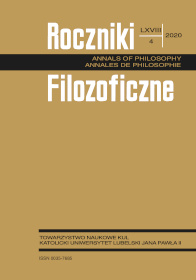Design or Evolution? God’s Creative Action in the World of Nature
Abstract
The article is devoted to the critical analysis of several arguments appearing in contemporary discussions regarding the interpretation of God’s creative activity in the world of nature, considered in the context of the theory of evolution. In particular, an attention was paid to some reservations about this theory put forward by some representatives of creationism contained within the framework of St. Thomas’s metaphysics, who see no way to reconcile evolution with the theological truth about God’s creation of the world. The arguments underlying the theory of intelligent design were also considered. This theory claims that chance-based evolution cannot adequately explain the „irreducible complexity” of living organisms, and that it must therefore be assumed that the course of evolutionary processes is primarily influenced by the direct actions of God—the Intelligent Designer.
References
Austriaco, Nicanor P. G., James Brent, Thomas Davenport, John B. Ku. Ewolucja w świetle wiary. Perspektywa tomistyczna. Tłum. Grażyna Gomola, Aleksander Gomola. Poznań: W drodze, 2019.
Barbour, Ian G. „Ways of Relating Science and Theology”. W: Physics, Philosophy and Theology: A Common Quest for Understanding. Red. Robert J. Russel, William Stoeger, George V. Coyne, 21–48. Vaticano: Vatican Observatory Publications, 1988.
Behe, Michael, J. Darwin’s Black Box: The Biochemical Challenge for Evolution. New York: Free Press, 1996. Wyd. polskie: Czarna skrzynka Darwina—biochemiczne wyzwanie dla ewolucjonizmu. Warszawa: Megas, 2008.
Behe, Michael, J. „Irreducible Complexity: Obstacle to Darwinian Evolution”. W: Debating Design: From Darwin to DNA, red. Michael Ruse, William A. Dembski, 352–370. Cambridge: CUP, 2004.
Bronk, Andrzej. Zrozumieć świat współczesny. Lublin: Towarzystwo Naukowe KUL, 1998.
Bronk, Andrzej, Stanisław Majdański. „Metodologia teologii”. W: Janeczek, Walczak, Starościc, Metodologia nauk, t. 2, Typy nauk, 127–159.
Bronk, Andrzej, Monika Walczak. „Metoda naukowa”. W: Janeczek, Walczak, Starościc, Metodologia nauk, t. 1, Czym jest nauka?, 89–153.
Dembski, William A. Intelligent Design. The Bridge between Science and Theology. Downers Grove, IL: InterVarsity Press, 1999.
Dupree, A. Hunter. „Christianity and the Scientific Community in the Age of Darwin”. W: Lindberg, Numbers, God and Nature, 351–368.
Grant, Edward. „Science and Theology in the Middle Ages”. W: Lindberg, Numbers, God and Nature, 49–75.
Hajduk, Zygmunt. O akceptacji teorii empirycznej. Lublin: Wydawnictwo KUL, 1984.
Heller, Michał, Tadeusz Pabjan. Stworzenie i początek wszechświata. Teologia—filozofia—kosmologia. Kraków: Copernicus Center Press, 2013.
Heller, Michał, Józef Życiński. Dylematy ewolucji. Kraków: PTT, 1990.
Heller, Michał. Czy fizyka jest nauką humanistyczną? Tarnów: Biblos, 1998.
Heller, Michał. Filozofia przypadku. Kosmiczna fuga z preludium i codą. Kraków: Copernicus Center Press 2011.
Heller, Michał. Sens życia i sens wszechświata. Studia z teologii współczesnej. Tarnów: Biblos, 2002.
Jan Paweł II. „Magisterium Kościoła wobec ewolucji”. L’Osservatore Romano 18, nr 1 (1997): 18–19.
Jan Paweł II. „Posłanie Jana Pawła II do George’a V. Coyne’a”. Zagadnienia Filozoficzne w Nauce 12 (1990): 2–12.
Janeczek, Stanisław, Monika Walczak, Anna Starościc, red. Metodologia nauk. T. 1–2. Lublin: Wydawnictwo KUL, 2019.
Krąpiec, Mieczysław A. „Ewolucjonizm, ale jaki?” W: Ewolucjonizm czy kreacjonizm, red. Piotr Jaroszyński, 7–40. Lublin: Fundacja Lubelska Szkoła Filozofii Chrześcijańskiej, 2008.
Jodkowski, Kazimierz. „Kreacjoniści przed sądem. Aspekty filozoficzne «małpich procesów»”. W: Poszukiwania filozoficzne, red. Jakub Michalczenia, Jadwiga Mizińska, Katarzyna Ossowska, t. 1, Nauka, Prawda, 175–198. Olsztyn: Instytut Filozofii UWM, 2014.
Lakatos, Imre. „Falsyfikacja a metodologia naukowych programów badawczych”. W: Imre Lakatos, Pisma z filozofii nauk empirycznych, tłum. Wojciech Sady, 3–169. Warszawa: PWN, 1995.
Lemańska, Anna. „Wyjaśnianie w nauce”. W: Janeczek, Walczak, Starościc, Metodologia nauk, t. 1, Czym jest nauka?, 231–249.
Lindberg, David C., and Ronald L. Numbers, red. God and Nature: Historical Essays on the Encounter between Christianity and Science. Berkeley: University of California Press, 1986.
Lindberg, David C. „Science in the Early Church”. W: Lindberg, Numbers, God and Nature, 19–48.
Maryniarczyk, Andrzej. „Prawda o stworzeniu świata”. Nasz Dziennik, 6.12.2017.
Matzke, Nicolas. „The Evolution of Creationist Movements”. Evolution Education and Outreach 3, nr 2 (2010): 145–162.
McMullin, Ernan. Ewolucja i stworzenie. Tłum. Jacek Rodzeń. Tarnów: Biblos, 2006.
Moore, James R. „Geologists and Interpreters of Genesis in the Nineteenth Century”. W: Lindberg, Numbers, God and Nature, 322–350.
Numbers, Ronald L. „The Creationists”. W: Lindberg, Numbers, God and Nature, 391–423.
Pabjan, Tadeusz. Anatomia konfliktu. Między nowym ateizmem a teologią nauki. Kraków: Copernicus Center Press, 2016.
Pabjan, Tadeusz. Świat najlepszy z możliwych? O dobroci Boga i pochodzeniu zła. Kraków: Copernicus Center Press, 2018.
Popper, Karl R. Logika odkrycia naukowego. Tłum. Urszula Niklas. Warszawa: PWN, 1977.
Słomka, Marek. Działanie Boga w przyrodzie. Analiza filozoficzna. Lublin: Wydawnictwo KUL, 2018.
Teoria Inteligentnego Projektu—nowe rozumienie naukowości? Red. Kazimierz Jodkowski. Warszawa: Megas, 2007.
Tomasz, św. Suma Teologiczna. Tłum. Pius Bełch i in. London: Veritas, 1963–1986.
Węcławski, Tomasz. „Metodologia teologii”. Nauka 3 (2004): 101–120.
Zon, Józef. „Nic nowego w starym sporze”. Filozoficzne Aspekty Genezy 23 (2005/2006): 25–33.
Życiński, Józef. Bóg i ewolucja. Podstawowe pytania ewolucjonizmu chrześcijańskiego. Lublin: Towarzystwo Naukowe KUL, 2002.
Copyright (c) 2020 Roczniki Filozoficzne

This work is licensed under a Creative Commons Attribution-NonCommercial-NoDerivatives 4.0 International License.





